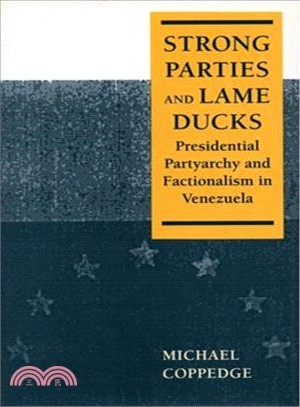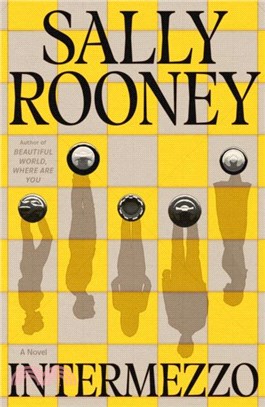Strong Parties and Lame Ducks ― Presidential Partyarchy and Factionalism in Venezuela
商品資訊
ISBN13:9780804722780
出版社:Stanford Univ Pr
作者:Michael Coppedge
出版日:1994/10/01
裝訂/頁數:精裝/241頁
規格:22.2cm*14.6cm*2.5cm (高/寬/厚)
定價
:NT$ 7200 元若需訂購本書,請電洽客服 02-25006600[分機130、131]。
商品簡介
作者簡介
相關商品
商品簡介
This bold and comprehensive reassessment of democracy in Venezuela explains why one of the oldest and most admired democracies in Latin America has become fragile after more than three decades of apparent stability. The Venezuelan crisis is puzzling because Venezuela has held competitive elections since 1958; it has the fastest-growing economy in the region and a declining inflation rate; the military has not meddled in politics since 1962; there is no guerrilla insurgency; and drug trafficking has only begun to make an appearance.
The author locates the causes of Venezuela's current problems in two political institutions. The first is partidocracia, or partyarchy. Venezuelan political parties monopolize the electoral process, dominate the legislative process, and block many of the informal channels of representation, such as interest groups, the media, the courts, and independent opinion leaders. The second cause is presidentialism, a system marked by frequent standoffs between the executive and the legislature that severely limit the president's ability to function effectively and that encourage opposition parties to frustrate the president in an effort to improve their own chances in future elections.
Highlighting parallels and contrasts with other countries in Latin America and the industrialized world, the author places Venezuelan democracy in a truly comparative context for the first time, in the process revealing that Venezuela has had the most extreme partyarchy in the non-communist world. The combination of partyarchy and presidentialism has induced a cyclical pattern of factional struggles within the governing parties that has rendered them incapable of channeling popular demands between elections and has tarnished their image during campaigns.
The author shows that though partyarchy initially helped democracy survive in Venezuela by giving a handful of party leaders great authority to manage crises and prevent mass disturbances, it also limited accountability and stifled meaningful popular participation, which ultimately eroded the legitimacy of the democratic regime. Partyarchy also made the executive-legislative stalemates and constitutional crises typical of presidential systems more likely and more intractable. The author supports his conclusions with evidence from his rigorous survey of 80 top leaders of the governing party, as well as from historical analysis, a multivariate model of Venezuelan elections, and more than a year of personal observation of party activities.
The author locates the causes of Venezuela's current problems in two political institutions. The first is partidocracia, or partyarchy. Venezuelan political parties monopolize the electoral process, dominate the legislative process, and block many of the informal channels of representation, such as interest groups, the media, the courts, and independent opinion leaders. The second cause is presidentialism, a system marked by frequent standoffs between the executive and the legislature that severely limit the president's ability to function effectively and that encourage opposition parties to frustrate the president in an effort to improve their own chances in future elections.
Highlighting parallels and contrasts with other countries in Latin America and the industrialized world, the author places Venezuelan democracy in a truly comparative context for the first time, in the process revealing that Venezuela has had the most extreme partyarchy in the non-communist world. The combination of partyarchy and presidentialism has induced a cyclical pattern of factional struggles within the governing parties that has rendered them incapable of channeling popular demands between elections and has tarnished their image during campaigns.
The author shows that though partyarchy initially helped democracy survive in Venezuela by giving a handful of party leaders great authority to manage crises and prevent mass disturbances, it also limited accountability and stifled meaningful popular participation, which ultimately eroded the legitimacy of the democratic regime. Partyarchy also made the executive-legislative stalemates and constitutional crises typical of presidential systems more likely and more intractable. The author supports his conclusions with evidence from his rigorous survey of 80 top leaders of the governing party, as well as from historical analysis, a multivariate model of Venezuelan elections, and more than a year of personal observation of party activities.
作者簡介
Michael Coppedge is Visiting Lecturer in Politics and International Affairs at Princeton University.
主題書展
更多
主題書展
更多書展今日66折
您曾經瀏覽過的商品
購物須知
外文書商品之書封,為出版社提供之樣本。實際出貨商品,以出版社所提供之現有版本為主。部份書籍,因出版社供應狀況特殊,匯率將依實際狀況做調整。
無庫存之商品,在您完成訂單程序之後,將以空運的方式為你下單調貨。為了縮短等待的時間,建議您將外文書與其他商品分開下單,以獲得最快的取貨速度,平均調貨時間為1~2個月。
為了保護您的權益,「三民網路書店」提供會員七日商品鑑賞期(收到商品為起始日)。
若要辦理退貨,請在商品鑑賞期內寄回,且商品必須是全新狀態與完整包裝(商品、附件、發票、隨貨贈品等)否則恕不接受退貨。
























